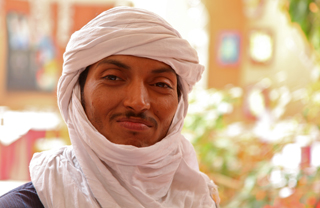Music |
Bombino
By
Published: Nov 18, 2015
Category:
World
You’ve never heard anything like Bombino’s music. The foundation is a drummer who plays tight, clipped, ruthlessly propulsive time. Then it’s thundering, amped-up bass and rhythm guitars. And then there’s Bombino, amazingly inventive, constantly surprising, musical to the core. No wonder he dances when he performs — though it’s not like any dance you’ve ever seen, more like a strut-and-stutter camel walk.
Right off, you have choices.
“Nomad,” his latest CD, is produced by Dan Auerbach, of the Black Keys. It’s 40 minutes of brilliant, protein-rich music: great for parties (you will come to be bored by friends asking “What is that?”), a lifesaver on rainy mornings when you don’t want to get out of bed, a good candidate for serious listening, a caffeine hit for long sessions of work when your friends are getting buzzed on Adderall, and, so far from least, an essential ingredient for ecstatic couplings at midnight. Americanized? Not much. [To buy the CD of ‘Nomad’ from Amazon, click here. For the MP3 download, click here.]
“Agadez” was recorded a few years before Bombino’s association with American musicians and American production. It’s dreamy, mysterious desert music, better suited to late-night listening than “Nomad’ — for sheer beauty, it’s the superior choice. [To buy the CD from Amazon, click here. For the MP3 download, click here.]
What’s so great about Bombino? First the writing: it’s all hooks. Hooks upon hooks until you are locked in a groove. But it’s mostly Omara "Bombino" Moctar’s guitar. It slithers. It buzzes. It’s round like Knopfler, spacey like Hendrix, concise like Ali Farka Toure.
Hearing is believing. Crank the volume. See if this doesn’t haul you out of your chair:
The back story: Omara Moctar was born in 1980. He’s a Tuareg. (Volkswagen named its off-road SUV after this tribe of desert nomads in Niger.) The Tuareg, who are descended from the Berbers of North Africa, are fiercely independent. Once they fought against colonialism. They’re Muslims who resist Islamic fundamentalism. (“These invaders from Mali are not welcome in any of our lands,” Moctar says. “We reject their philosophies and their idea of Islam.”)
In the 1990s, civil war wracked Niger. The Tuaregs were declared enemies of the state. Moctar and his family fled to Algeria. Relatives brought guitars, and Moctar learned to play. Fighting subsided. Moctar’s family returned to Niger. But in 2007, when he’d launched a band, there was a second Taureg rebellion and a harsher government response. Two of Moctar’s musicians were killed; Moctar fled to Burkina Faso.
On his first, under-the-radar America tour, Moctar met Dan Auerbach. They had no common language, but a short session of music made it clear they could collaborate.
Auerbach: “He would triple his guitar leads, and he’d do it note-for-note, first take. It sounds massive. His guitar’s running through fuzz pedals, with double drummers playing at the same time — lots of percussion.”
Translation: This is desert music, but it’s been processed in a Nashville studio. Not to trick it up, but to make it stronger. And it is. There are no English lyrics; because they’re in a language you don’t speak, the words have power only as sounds. Which I prefer.
Maybe more music will come along that delivers both novelty and creativity. I’m not holding my breath. I see “Nomad” as I once saw SMOD — as the most exciting World music of the year.
[Many thanks to Kenneth Scigulinsky]


